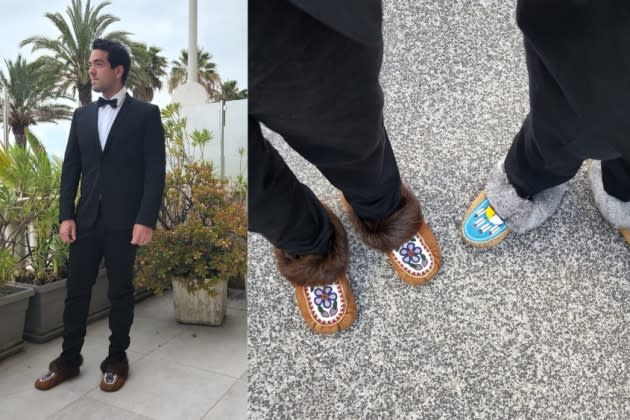Indigenous Producer Says He Was ‘Treated Like a Criminal’ for Wearing Moccasins on Cannes Red Carpet
- Oops!Something went wrong.Please try again later.

An Indigenous Canadian producer who was turned away from the Cannes red carpet for wearing traditional moccasins says he was made to feel like “a criminal” for representing his culture at the world’s foremost film festival.
Vancouver-based producer Kelvin Redvers, who is a member of the Dene nation, was in line to walk the red carpet for the world premiere of Valeria Bruni Tedeschi’s “Les Amandiers” on Sunday (May 22) when he was stopped in his tracks by red carpet security.
More from Variety
Redvers was part of a contingent of Indigenous producers who were in Cannes for the first time, pitching their projects and experiencing the festival. The group’s trip was backed by Canadian funding org Telefilm, Toronto-headquartered Indigenous Screen Office and Capilano University’s FILMBA program.
Originally from the Northwest Territories, Redvers was in the festival’s requisite red-carpet attire of black tie but had swapped out the skate shoes he walked to the Palais des Festivals in for a pair of brown moccasins.
“I was hoping to wear an example of something that would be formal for my culture, which was a beautiful pair of moccasins that were actually beaded by my sister,” says Redvers. “I was pretty excited to wear those.”
But as soon as security guards spotted the moccasins, they blocked Redvers from the red carpet, and after a confused back and forth among staff, the producer was asked to leave. Although his French-speaking colleague tried to explain that Cannes is meant to have flexibility for cultural outfits such as saris and kilts, protestations fell on deaf ears.
“A fairly aggressive security guard got fed up, got right in my face and said, ‘You need to leave now. Leave now. Leave now. Leave now. Leave!’” says Redvers. “I was very confused and hurt; I felt belittled. I was being treated like a criminal for just trying to wear my formal traditional wear.”
Redvers was only allowed back on the red carpet after changing into his regular shoes.
Cannes has had a long history of red carpet controversy, and in the past turned away women wearing flat shoes instead of high heels. Although this outdated rule, which was never codified, seems to have been largely relaxed, Cannes attendees continue to have run-ins with security on the red carpet. Last week, Variety awards editor Clayton Davis was pulled aside for wearing a white tuxedo instead of a black or blue outfit, despite another individual in a white tux, who was white, walking the carpet without any issue.
After Telefilm and the Indigenous Screen Office complained about Redvers’ altercation, top brass at Cannes — including the festival’s secretary general François Desrousseaux and the head of the red carpet — met with Redvers and his advocates the next day, and apologized for the commotion.
Yet, oddly, Cannes leadership admitted that even if Redvers’ case had been presented to the red carpet staff that makes the final call on admittance, he would have been turned away because his moccasins “just didn’t fit the approval levels of what formal wear is.”
“One of the problems is I was only wearing one piece of my formal wear,” says Redvers. “If I’d been wearing the full regalia, they would have put me through, which is interesting because it really limits formal wear into a preconceived idea — and a Western idea — of what formal wear should be.”
Kerry Swanson, co-executive director of the Indigenous Screen Office, says the group had a “productive and open conversation” with Cannes executives, but highlights that because red carpet staff are making subjective decisions about formal wear, “expanding the vocabulary of cultural attire is necessary to ensure this doesn’t happen again.”
“If security is confronted with cultural attire they are not familiar with, it would be better to err on the side of allowing them in rather than keeping them out,” says Swanson.
This is especially crucial, she says, given the growing wave of Indigenous-made work getting global attention, which means more Indigenous filmmakers will be present at international festivals like Cannes.
Added Redvers: “Our goal is to create awareness that a ribbon skirt may not look necessarily formal but in a cultural context, it’s tremendously important when it comes to ceremony in Indigenous communities. They’re willing to hear it and we want to start a conversation over the summer so that if someone else shows up in moccasins or a ribbon skirt in Cannes, [organizers] know what to look for.”
Cannes invited Redvers to walk the red carpet on Monday, for the world premiere of Canadian director David Cronenberg’s “Crimes of the Future” — and this time, his moccasins got the green light.
“The next day, at the red carpet, although the first security guard who saw us was about to say something, the next person saw how we were dressed and said, ‘Yes, let them through,’” says Redvers. “That was my favorite moment of my festival: to walk in and get kicked out for a case of cultural wear, and the next day to have changed the understanding for myself and other people on the red carpet.”
A spokesperson for the Cannes Film Festival did not respond to requests for comment.
Best of Variety
Sign up for Variety’s Newsletter. For the latest news, follow us on Facebook, Twitter, and Instagram.

